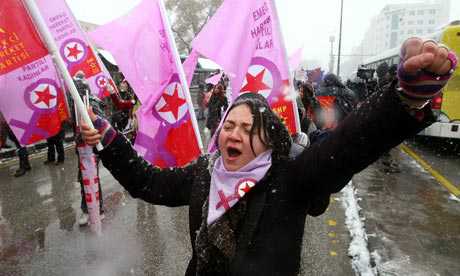Elif Shafak
Guardian
‘Honour’ killings are often cited as a symptom of Turkey’s strict patriarchal society. It’s time we faced up to this horror

The month of March began in Turkey with another “honour” killing. In Mersin, a large port on the Mediterranean, the police found the body of 19-year-old Hatice Firat. She had been stabbed 40 times. While her story made the front page of every major newspaper in the country and her picture became the face of an archaic custom, her body was not claimed by her family. Nor was her funeral attended by relatives. In the end a group of women – neighbours and friends – carried her casket from the morgue to the cemetery nearby and buried her. Along the way, they chanted slogans such as “We won’t be anyone’s honour”, “Stop crimes against women”.
Hatice Firat was not killed by a stranger on the street – the main suspect is her brother. In this country, women are hurt the most by those they love the most. Often police have enough evidence to suspect that the decisions to end their lives have been reached by the family collectively – a common pattern in so-called “honour” killings. Fathers give the verdict, mothers support the decision, remain silent or simply cannot control the course of events, and brothers often commit the crime.
Published figures can never do justice to the actual numbers of women who suffer violence. Information is limited, suppressed. Still, it has been officially acknowledged that 1,091 women have been victims of such crimes between 2000 and 2005.
Since then, some steps have been taken in Turkey to tackle this problem. The penal code was revised. Life sentences were imposed for murderers, regardless of their age – a defining detail as in most cases the youngest sons are used as cat’s paws. However, the legal improvement is not implemented fully, and does not go far enough. Besides, it has brought its own problems. Over the past years the number of female suicides has actually increased. Families who do not want their sons to end up in prison for life are now encouraging shameful daughters to end their own lives. Stories abound about girls who are given a rope, pistol or poison to kill themselves. There are also cases of covered-up murders made to look like suicides.
As I write, the country is fervently debating the subject. One side claims, by focusing on statistics, that violence against women is on the rise. The other side argues that this was always the case and the only difference now is that we have started to talk about the problem – and deal with it.
European commentators often cite honour killings as proof of Turkey’s essential cultural otherness – even when they take place in other countries in Europe. But Turkey is a complicated country, with many shades and nuances. It cannot be easily placed into a single category. The civil code abolished polygamy and introduced equal rights in divorce, custody and inheritance as early as 1926. Women are highly visible and vocal in a number of areas, such as media, literature, art, advertisement, banking and medicine. Likewise in the academic world, both among students and faculty, the percentage of women is at times higher than the European average.
In many households, even seemingly traditional ones, matriarchy rules. A mother earns respect, authority and power as she ages. Unfortunately some matriarchs ride roughshod over the younger women in the family, particularly their daughters-in-law. What they have suffered from in the past they inflict upon others. Nonetheless, women can have an amazing influence in the household.
This is one side of the coin. On the other side are the impoverished regions where patriarchy is still as solid as always. Turkish politics is still a man’s world. At local, regional and national level the main political actors are male and the language is overtly masculine.
There are several words in the Turkish language for honour, each with different connotations. Male honour, namus, is defined through women. When a woman does anything degrading she brings shame to the entire family. The word onur is more masculine and is used in matters related to one’s country, patriotism and so on. The word sheref can be both male and female, and it is this kind of honour that we refer to when we make a toast at a party. Most importantly, different criteria of honour are applied to different sexes.
Since my childhood I have heard more than once old women advising young women to be modest. Traditionally, females and males are thought to be cut of different cloth. Women are cut of the lightest cambric whereas men of thick, dark velvet. The colour black doesn’t show stains, unlike the colour white, which reveals even the tiniest speck of dirt. A woman who is believed to have lost her modesty is at times worth no more than a chipped coin. There are always two sides of the coin: dignity or disgrace, and little consolation for those who get the wrong side.
Times are changing, true, and patriarchy is melting away. For now, though, it isn’t melting away fast enough. Today we are still looking for honour in all the wrong places.
via Turkey: Looking for honour in all the wrong places | Elif Shafak | Comment is free | guardian.co.uk.

